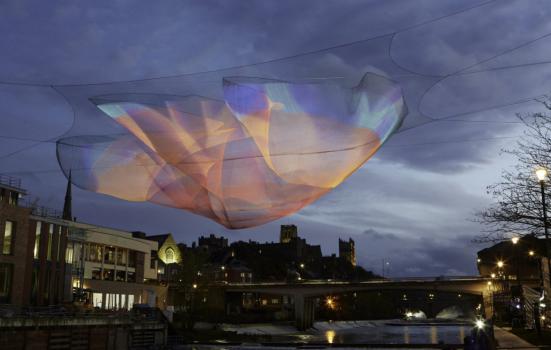
Lumiere 2015 in Durham. The light festival came to London in 2016
Photo: Matthew Andrews
Business districts encouraged to partner with cultural sector
Culture is the perfect vehicle to engage people in conversations about heritage and local identity, a new report concludes.
Collaboration between businesses and cultural organisations has been put forward as a potential solution to Brexit-related uncertainty, falling public funding and rising business rates.
The new ‘Improving Places’ report, jointly produced by Arts Council England, King’s College London and the Mayor of London, examines Business Improvement Districts (BIDs) across the UK and finds they can help communities thrive and drive economic growth.
Culture is positioned as key to the success of a BID – business-led organisations set up to improve an area with investment from local businesses – as it is the “perfect vehicle” to engage people in conversations about citizenship, heritage and local identity.
To this end, the report calls on Government to introduce tax incentives for such partnerships, advises cultural organisations to actively connect with BIDs, and recommends business districts put culture “at the heart” of their night-time offer.
“The research highlights the success of such partnerships in boosting the economy, bringing people together, promoting tourism and civic pride, and revitalising neighbourhoods,” the authors write.
They continue: “Local challenges require local solutions – and partnerships that reflect those unique situations. Among these case studies are useful lessons for BIDs in small towns and big cities, in cultural hubs and places with fewer such amenities.
“Now more than ever we must address local issues by sharing best practice from across the country and exploring the potential for new partnerships.”
Quality projects
The report includes a series of case studies of collaborations between BIDs and cultural organisations, such as Lumiere London light festival and the regeneration of Vauxhall’s nightlife.
Although it concludes measuring the impact of BIDs is a challenge – given data can be hard to record, subjective or publicly unavailable – the report identifies six ways in which BIDs and cultural organisations can help each other:
- Placemaking, by using local knowledge to help develop “innovative neighbourhoods”
- Place-branding, by promoting an area as distinctive and attractive for locals and visitors
- Business development, by helping industry professionals and entrepreneurs grow their businesses
- Providing affordable spaces
- Building stronger communities by involving local people as ambassadors
- Creative programming of activities that highlight a location’s unique offer and raise public profile.
Commenting on the report, Justine Simons, the Mayor’s deputy for culture, said: “When businesses work with cultural organisations, cities thrive. That could mean a festival that increases footfall or a new take on the public realm that changes the way people see their neighbourhood.
“Such collaborations create better places.”
Recommendations
Cultural organisations are advised to connect with BIDs to share information and priorities, to ask BIDS for space – including outdoor space for events or facilities – and to establish joint marketing campaigns for maximum reach and impact.
On a strategic level, local authorities are advised to consult BIDs ahead of producing local plans; the Mayor’s office should select a BID champion for the cultural leadership board; and the Government should consider tax incentives for cultural projects where BIDs are partners and make BID projects eligible for central government funding across departments.
A range of other recommendations are included for key stakeholders, including setting up a forum for culture, police, licensing, environment and transport representatives to support the night-time offer.
Join the Discussion
You must be logged in to post a comment.